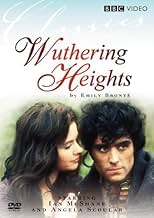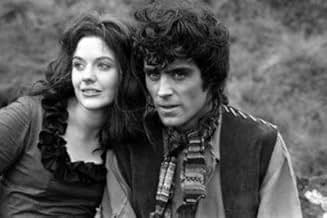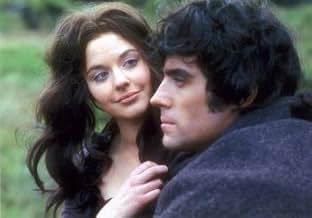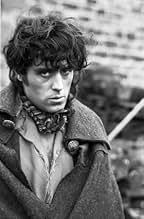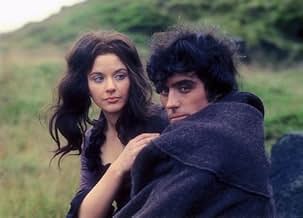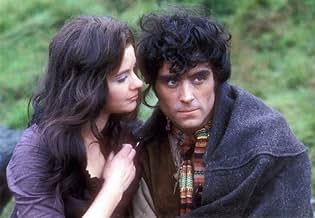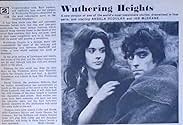Emily Bronte's classic story of destructive passion and immortal love.Emily Bronte's classic story of destructive passion and immortal love.Emily Bronte's classic story of destructive passion and immortal love.
6.5108
1
2
3
4
5
6
7
8
9
10
Featured reviews
Kate Bush liked this version; me, not so much
As many of you might know, Kate Bush wrote her song, Wuthering Heights, shortly after she and her family watched this version at home way back when.
And, intrigued, I hunted down the DVD-among all of the available versions-to see why she enjoyed it so much.
On a rainy, dreary Saturday, my wife and I hunkered down and watched all four parts (182 minutes worth). Here are my admittedly unprofessional criticisms:
The setting in the moors, while hauntingly beautiful, wasn't captured well. Everything was blurry and trembly. Yes, I understand these were 1960's production values, but this just seemed cheap and rushed. As did the residence settings and costumes.
The acting was slipshod. While the two main characters were fairly well-acted, most of the other acting was hit or miss...mostly a miss.
I won't comment on Emily Bronte's characters, though none were really likable. Another time, another place. I get that.
We sat through the entire thing but both commented later that it was pretty horrible, overall.
I'd recommend skipping this mess and just watching Kate's video.
And, intrigued, I hunted down the DVD-among all of the available versions-to see why she enjoyed it so much.
On a rainy, dreary Saturday, my wife and I hunkered down and watched all four parts (182 minutes worth). Here are my admittedly unprofessional criticisms:
The setting in the moors, while hauntingly beautiful, wasn't captured well. Everything was blurry and trembly. Yes, I understand these were 1960's production values, but this just seemed cheap and rushed. As did the residence settings and costumes.
The acting was slipshod. While the two main characters were fairly well-acted, most of the other acting was hit or miss...mostly a miss.
I won't comment on Emily Bronte's characters, though none were really likable. Another time, another place. I get that.
We sat through the entire thing but both commented later that it was pretty horrible, overall.
I'd recommend skipping this mess and just watching Kate's video.
Storms Beneath the Surface: Wuthering Heights (1967)
There have been many takes on Wuthering Heights, but the 1967 adaptation brings a distinct flavor-less polished, more intimate, and brimming with restrained intensity. Rather than rely on sweeping theatrics, this version leans into a quieter melancholy, letting the emotional erosion of its characters echo through the moors like distant thunder.
Shot with a stark, almost stage-like simplicity, the film feels stripped down but not underwhelming. That rawness becomes its strength. With limited embellishment, the haunting core of Emily Brontë's story comes into sharper focus-one of obsession, longing, and the slow decay of hearts that cannot move on.
The performances are tightly wound, simmering instead of shouting. It's less about the violence of love and more about its stillness-the ache of it, the silence that follows where words should be. The actors deliver not with melodrama, but with presence, allowing subtle gestures and weighted glances to speak volumes.
The film's atmosphere, while modest in scope, manages to capture the emotional landscape of the novel. You can almost feel the damp chill in the air, the emptiness of windswept hills, and the hollowness left behind when love turns inward and begins to rot.
Wuthering Heights (1967) may not be the loudest or most lavish adaptation, but it lingers. It whispers, not roars-and in doing so, becomes a ghost of itself. A haunting, tragic echo.
Shot with a stark, almost stage-like simplicity, the film feels stripped down but not underwhelming. That rawness becomes its strength. With limited embellishment, the haunting core of Emily Brontë's story comes into sharper focus-one of obsession, longing, and the slow decay of hearts that cannot move on.
The performances are tightly wound, simmering instead of shouting. It's less about the violence of love and more about its stillness-the ache of it, the silence that follows where words should be. The actors deliver not with melodrama, but with presence, allowing subtle gestures and weighted glances to speak volumes.
The film's atmosphere, while modest in scope, manages to capture the emotional landscape of the novel. You can almost feel the damp chill in the air, the emptiness of windswept hills, and the hollowness left behind when love turns inward and begins to rot.
Wuthering Heights (1967) may not be the loudest or most lavish adaptation, but it lingers. It whispers, not roars-and in doing so, becomes a ghost of itself. A haunting, tragic echo.
Hit and miss.
In recent months some generous fellow has uploaded this to Dailymotion. I was getting round to purchasing the DVD at some point which is the only way I believed this was available. However it is now online so that is a boon. However, was the wait worth it? Probably not. I have seen most other adaptations of WUthering Heights. None of them really seem to hit the spot, but my favourite is the 1978 TV version because it is a complete rendering of the novel and also it highlights the gothic aesthetic and vibe of the novel which I enjoy. This 1967 version is very similar in that regard. It is a complete rendering of the novel, it doesn't just focus on Kathy and Heathcliff's relationship, it includes all the revenge and Heathcliff's decline after Kathy leaves the story. It also also play sup the gothic aspect of the story. There is a fantastic continuous gale that blows in the background of the entire thing, giving it a gusty and cosy and dark atmosphere. It is a shame that the version on the DVD and online is only a black and white print, it would have been better to see it in its original colour, alas this version no longer exists.
The main criticism which lets the whole thing down is that the character portrayals are not nuanced enough. Heathcliff comes across as almost entirely an unliveable character, we don't see any of the other side of him. The story becomes very dark with absolute no sense of redemption. And the do change some plot elements to make it even more depressing than it is unecessarily. If I could pick and choose the best elements form all the WH adaptations we may have the perfect version, but alas, on its own this is not it.
The main criticism which lets the whole thing down is that the character portrayals are not nuanced enough. Heathcliff comes across as almost entirely an unliveable character, we don't see any of the other side of him. The story becomes very dark with absolute no sense of redemption. And the do change some plot elements to make it even more depressing than it is unecessarily. If I could pick and choose the best elements form all the WH adaptations we may have the perfect version, but alas, on its own this is not it.
Faithful adaptation that could have easily been better
As a collector of versions of Wuthering Heights, I was very excited to obtain this 1967 miniseries on DVD and watch it for the first time. On the whole, this is an impressively faithful rendering of the novel – although a few minor liberties might have created a stronger production. Here are my impressions of the positive and negative aspects:
Good: The black and white photography and ever-present howling wind both contribute much to the general bleakness in a way that I found appealing (the wind made it a little hard to hear the dialog at times, though!). They helped to create an atmosphere that seemed musty, suffocating and hostile (the interior scenes), and wild and unpredictable (the moors). Ian McShane is an ideal Heathcliff, dusky and moody and quick to anger. All of the actors were quite well-chosen for their parts, with Isabella, Hareton, Edgar and Linton particularly fine. Cathy is tough to get right but Angela Scoulari is convincingly childish, petty, fervent and hysterical by turns.
Bad: The acting is a little over-the-top in a manner usually found in the theater, not in a film, where subtlety can be appreciated. Even the hairpieces and mustaches seemed like stage contrivances that would be fine at a distance, but not good enough for close camera scrutiny. And Angela Scoulari is appealingly pretty but her voice was quite high-pitched and forced, as though she was trying hard to sound younger. I found myself turning the volume down at times to soften the squealing tone of it. As for the storyline, they gave us almost none of the tender moments on the moor between young Heathcliff and Cathy; one moment she and Hindley are tormenting him relentlessly, then Hindley goes to school and suddenly she and Heathcliff are inseparable. They could have easily spent a little more time establishing their unnaturally close bond, and sacrificed a little of the slower, dragging pace of the 4th part.
Well worth seeing for viewers who love the novel
Good: The black and white photography and ever-present howling wind both contribute much to the general bleakness in a way that I found appealing (the wind made it a little hard to hear the dialog at times, though!). They helped to create an atmosphere that seemed musty, suffocating and hostile (the interior scenes), and wild and unpredictable (the moors). Ian McShane is an ideal Heathcliff, dusky and moody and quick to anger. All of the actors were quite well-chosen for their parts, with Isabella, Hareton, Edgar and Linton particularly fine. Cathy is tough to get right but Angela Scoulari is convincingly childish, petty, fervent and hysterical by turns.
Bad: The acting is a little over-the-top in a manner usually found in the theater, not in a film, where subtlety can be appreciated. Even the hairpieces and mustaches seemed like stage contrivances that would be fine at a distance, but not good enough for close camera scrutiny. And Angela Scoulari is appealingly pretty but her voice was quite high-pitched and forced, as though she was trying hard to sound younger. I found myself turning the volume down at times to soften the squealing tone of it. As for the storyline, they gave us almost none of the tender moments on the moor between young Heathcliff and Cathy; one moment she and Hindley are tormenting him relentlessly, then Hindley goes to school and suddenly she and Heathcliff are inseparable. They could have easily spent a little more time establishing their unnaturally close bond, and sacrificed a little of the slower, dragging pace of the 4th part.
Well worth seeing for viewers who love the novel
Positive memories and request for video/DVD release
I remember this as a wonderfully rugged version of the story, very earthy and passionate. It captured the wildness of the moors and the Yorkshire weather in a way that the Olivier version never managed.
McShane was born to play Heathcliff and I am sure set many other teenage hearts pounding as well as mine. Cathy was alternately lyrically beautiful and utterly terrifying.
This hallmark BBC production has a second claim to fame. The terrifying spectre of Cathy at the window inspired Kate Bush to write that song.
I wish someone would bring it out on video. It may not be as good as I recall it, and indeed often older TV productions seem stilted by today's standards- but nonetheless, I am certain it would be worth a second look.
McShane was born to play Heathcliff and I am sure set many other teenage hearts pounding as well as mine. Cathy was alternately lyrically beautiful and utterly terrifying.
This hallmark BBC production has a second claim to fame. The terrifying spectre of Cathy at the window inspired Kate Bush to write that song.
I wish someone would bring it out on video. It may not be as good as I recall it, and indeed often older TV productions seem stilted by today's standards- but nonetheless, I am certain it would be worth a second look.
Did you know
- TriviaIan McShane sprained his wrist early in the filming, but struggled on to complete the mini-series.
- ConnectionsFeatured in Reader, I Married Him: Heroes (2006)
Details
- Release date
- Country of origin
- Official site
- Language
- Also known as
- Rüzgarlı Bayır
- Production company
- See more company credits at IMDbPro
- Runtime
- 50m
- Color
- Color(original broadcast)
Contribute to this page
Suggest an edit or add missing content

